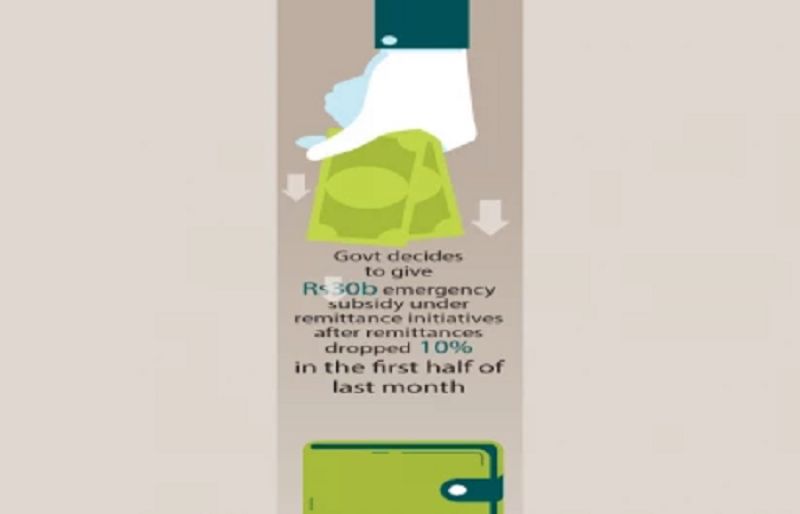ISLAMABAD: The federal government has decided to allocate an initial supplementary grant of Rs30 billion to reinstate subsidies on foreign remittances, highlighting the absence of proper consultation among stakeholders before the finance ministry removed these subsidies from the budget in June.
Government sources told The Express Tribune that the finance ministry has conceded to the central bank’s demand for subsidies under the Pakistan Remittances Initiative from the budget.
However, the ministry agreed only after Prime Minister Shehbaz Sharif ordered it to urgently disburse funds for the scheme.
Finance ministry officials said the scheme would now be fully funded, and in the first phase, about Rs30 billion could be approved very soon by the Economic Coordination Committee (ECC) of the Cabinet.
The officials said that since there was no allocation in the budget, the money would be taken out of the contingency fund, which the federal government has retained to meet unforeseen expenses.
Once the Rs30 billion is exhausted, further allocations will be made during the course of the fiscal year, they added.
In the last fiscal year, the finance ministry had allocated Rs87 billion for the subsidies. But against the Rs87 billion allocation, the central bank had billed Rs200 billion to the Ministry of Finance.
Of the total cost, around 85%, or Rs170 billion, was under the Telegraphic Transfer (TT) Charges Scheme.
Due to the growing cost of subsidies, the finance ministry discontinued budgetary allocations and instead asked the central bank to fund the scheme, as maintaining foreign exchange reserves was the SBP’s responsibility.
Last month, Special Secretary Finance Nasheeta Mohsin told the Senate Standing Committee that “we are very clear that there is no money in the new budget for the Pakistan Remittances Initiative and the central bank will have to find the funding sources.”
But the central bank also informed the government last month that under the International Monetary Fund (IMF) programme, it cannot offer any kind of subsidies.
“Overseas Pakistanis are our strength and valuable assets, and their hard-earned remittances play a vital role in Pakistan’s development,” said PM Sharif last week while ordering the finance ministry to resume subsidies.
Sources said that SBP Governor Jameel Ahmad stated in one of the meetings that due to the discontinuation of subsidies, the flow of remittances had dropped in double digits during the first half of July.
However, finance ministry officials said the slowdown in remittances could be seasonal and should not be attributed solely to the discontinuation of the scheme.
SBP data shows that remittances reached a historic high of $38.3 billion in the fiscal year 202425, a 27% increase from $30.25 billion in the previous year.
But the finance ministry viewed it as a Rs200 billion subsidy burden.
The government has not been able to substantially increase exports, which barely touched $32 billion in the last fiscal year.
Remittances helped ease pressure on foreign exchange reserves.
Any slowdown in remittances may further pressure the rupee, which in recent days has started appreciating due to official intervention in the market.
The ministry also had genuine concerns that financial institutions were breaking one remittance transaction into many to claim more financial benefits, and there was a need to scrutinise the payments.
Acting Deputy Governor of the central bank Dr Inayat Hussain also cautioned last month that the government’s decision to curtail subsidies for promoting foreign remittances may reduce the flow of these payments through banking channels.
The federal cabinet has already approved a substantial reduction in remittance incentives.
Following the revised scheme, the central bank issued changes that significantly reduced benefits for banks and exchange companies.
The government doubled the minimum eligible transaction size to $200 and introduced a flat rebate rate of Saudi Riyal 20 per eligible transaction, effective July 1, 2025.
The old rate ranged from 20 SAR to 35 SAR, which has now been cut by 43%.
The TT Charges Scheme offers a zero-cost and free transfer model to the sender and receiver for eligible remittance transactions.
The old model offered 20 SAR reimbursement for every transaction worth $100 and above, an additional incentive of up to 10% on growth over the previous year, and a further incentive of SAR 7 for growth exceeding 10% over the previous year.
The federal government also decided that a mechanism should be established to gradually phase out the Remittance Incentive Schemes.
In that regard, the SBP has been asked to propose and present an evidence-based plan factoring in a cost-benefit analysis of existing schemes, Raast integration with Buna and SAMA gateways, and strengthened controls on transferring remittances through formal channels.
The government has also abolished the Exchange Companies Incentive Scheme (ECIS), under which these companies were receiving up to Rs4 per dollar as a government subsidy.

